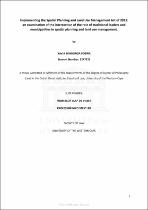| dc.description.abstract | This study examines the intersection of the role of traditional leaders and municipalities in spatial planning and land use management. More specifically, the study interrogates the factors which led to tension and conflict between traditional leaders and municipalities in three provinces, namely, the Eastern Cape, Limpopo and KwaZulu-Natal, over the implementation of SPLUMA in areas governed by traditional leaders. These are the provinces where traditional leaders, through protest action, publicly expressed their grievances and disapproval of SPLUMA soon after it came into effect in 2015. They vowed to resist its implementation in the areas they governed even if it meant being imprisoned for doing so. The study analysed data from 32 key informants, personal observations, and the relevant constitutional provisions, statutes, case law, governmental reports and White papers, including the relevant literature on the history of both the institution of traditional leadership and local government in South Africa. The study identified the underlying reasons why in practice the implementation of the Spatial Planning and Land Use Management Act 16 of 2013 (came into force in 2015) in areas governed by traditional leaders is facing opposition. There are six main reasons which emanate from the interviews that were conducted with the abovementioned informants. These reasons are (1) the lack of meaningful engagement by traditional leadership when SPLUMA was introduced at national level; (2) outright rejection of SPLUMA; (3) misunderstanding of SPLUMA; (4) the lack of trust in municipalities; (5) the lack of trust in planning instruments and processes; and (6) the exclusion of traditional leaders from municipal planning tribunals. Nevertheless, given that the institution of traditional leadership is entrenched in South Africa’s rural society, traditional leader’s closeness and familiarity with rural people in their area, and importantly the role they play in land use management, the study concludes there is a need to find ways to diffuse or manage the contestation between traditional leaders. Options proposed include, national government meaningfully engaging the National House and Provincial houses of traditional leadership about SPLUMA, recognise traditional leaders as authorities of first instance in municipal planning by-laws, include traditional leaders as members/participants of the Municipal Planning Tribunals, as well as, capacitating traditional leaders to understand the meaning and benefts of land use schemes in municipal council meetings and formulating a developmental beneficiation model between traditional leaders and municipalities on land use management matters. | en_US |

